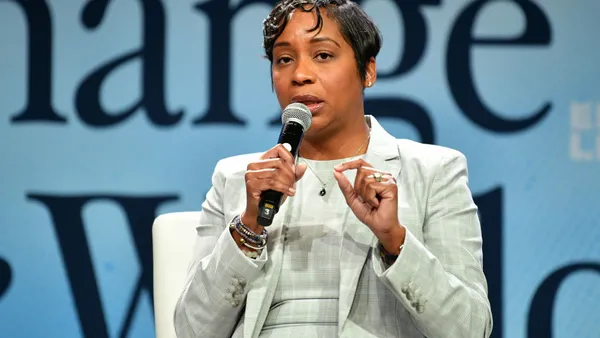Dive Brief:
- Several IHOP franchises have agreed to pay $700,000 after the U.S. Equal Employment Opportunity Commission (EEOC) sued them, alleging they failed to prevent or correct continual sexual harassment and retaliation against employees (U.S. Equal Employment Opportunity Commission v. Lucinda Management, LLC, et al., No. 2:17-cv-02458 (D. Nev. Feb. 19, 2019)). They will also have to create an HR department of professionals with experience handling and preventing discrimination, harassment and retaliation.
- The franchises created a hostile work environment for employees after they ignored worker complaints about harassment, EEOC alleged in its complaint. Furthermore, the restaurants allegedly retaliated against some of the employees who spoke up about the problems, behavior which included reducing work hours, groundless discipline and termination. One restaurant, the complaint said, fired an employee after the worker reported seeing a cook "regularly touch female food servers' genitals and kiss them."
- The restaurants also agreed to disengage their current 72-hour sexual harassment policy, which required employees to submit complaints of sexual harassment in writing within 72 hours. The franchises will work with an EEO monitor who will, among other things, ensure any harassment-related policies, procedures and practices comply with Title VII and the consent decree's requirements.
Dive Insight:
When workers come to a manager, a supervisor or HR with a complaint, it generally benefits the employer if that complaint is handled with care, as this case suggests. This rings true when complaints contain allegations of sexual harassment, of course, but the lesson applies more broadly; in fact, employers have made listening to employees a priority in 2019.
To promote this kind of culture — and, specifically, to promote it around the issue of sexual harassment — those in leadership must receive training on how to field complaints. And employees need training, too, on how to spot sexual harassment, how to report it and what to expect once they've done so. Employers should hold harassment trainings at least once a year, with separate sessions for employees and managers, Constangy Brooks, Smith & Prophete Partner Robin Shea previously told HR Dive. With yearly training, employees will know what to expect and those in leadership will understand the standards to which they and their employees will be held. A key accompaniment to training is a fail-safe, standardized reporting process, Shea noted.
Of course, employees will have reason to complain about incidents outside the realm of sexual harassment. A Google employee took on her employer's accommodation policy in November, and her actions prompted change within the company. But the life cycle of a complaint is not always so simple or positive. It may occur that HR must launch an investigation into a complaint. When this occasion arises, it's important the investigation is conducted in "good faith," attorneys have previously told HR Dive. This will require HR to conduct interviews, hear out the accusers and the accused and make a decision and implement a solution (and sometimes discipline as best it can), documenting the process all the while.














